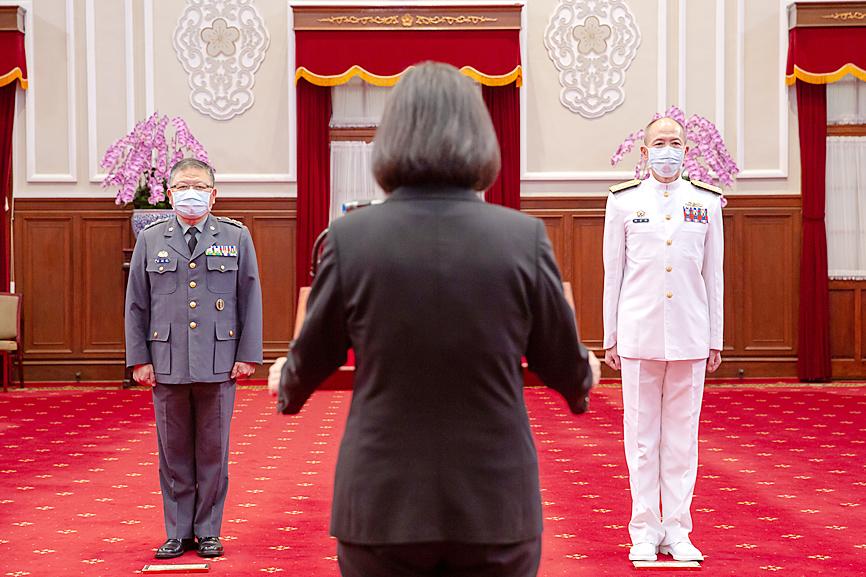President Tsai Ing-wen (蔡英文) yesterday touted the importance of enhancing the nation’s self-defense capabilities in a ceremony marking the shuffling of military brass.
Tsai’s remarks came amid rising tensions across the Taiwan Strait and on the same day the Chinese Communist Party celebrated the centennial of its founding in Beijing.
General Chang Guan-chung (張冠群), a former deputy minister of national defense, received the Order of the Cloud and Banner from Tsai, as he stepped down to assume the post of military strategy adviser at the Presidential Office.

Photo courtesy of the Presidential Office via CNA
Admiral Mei Chia-shu (梅家樹), the Deputy Chief of the General Staff and its executive officer, was promoted from vice admiral.
Taiwanese have high expectations for the armed forces and there is no time to wait to bolster national defense, Tsai said in a dedication at the Presidential Office in Taipei.
Chang’s decoration and Mei’s promotion were well deserved, and they are expected to continue their tireless work in improving the armed forces, she said.
As vice minister of national defense for armaments, Chang made immense contributions to the development of equipment, medical services and organizational work in military mobilization, Tsai said.
Chang’s grasp of technology played an important role in the development of armored fighting vehicle turrets, indigenous warship weapon systems and the T-5 Brave Eagle jet trainer program, she said.
He would continue to advise the government on improving weapons systems, she added.
Mei has a broad understanding of naval affairs from his tenure as captain of the ROCS Kee Lung, commander of the 146th Fleet and director of the Armaments Bureau, Tsai said, adding that she has full confidence in his ability to lead the navy.
Spouses of service members have the nation and the presidency’s gratitude for taking care of soldiers, she added.
The military confronts a complex environment shaped by the COVID-19 pandemic and China’s military threats, Minister of National Defense Chiu Kuo-cheng (邱國正) told officials at another ceremony on Wednesday.
The military is to focus on improving training standards, to ensure that troops act decisively, and implement the combined arms operational concept, he said.
Additionally, the military must strengthen multiagency cooperation in defense mobilization, and integrate civilian and wartime preparations, he said.
Officers should improve internal administration, exercise leadership, be thoroughly informed of the threat environment and possess the will to defend the nation, he said.

Chinese spouse and influencer Guan Guan’s (關關) residency permit has been revoked for repeatedly posting pro-China videos that threaten national security, the National Immigration Agency confirmed today. Guan Guan has said many controversial statements in her videos posted to Douyin (抖音), including “the red flag will soon be painted all over Taiwan” and “Taiwan is an inseparable part of China,” and expressing hope for expedited reunification. The agency last year received multiple reports alleging that Guan Guan had advocated for armed reunification. After verifying the reports, the agency last month issued a notice requiring her to appear and explain her actions. Guan

GIVE AND TAKE: Blood demand continues to rise each year, while fewer young donors are available due to the nation’s falling birthrate, a doctor said Blood donors can redeem points earned from donations to obtain limited edition Formosan black bear travel mugs, the Kaohsiung Blood Center said yesterday, as it announced a goal of stocking 20,000 units of blood prior to the Lunar New Year. The last month of the lunar year is National Blood Donation Month, when local centers seek to stockpile blood for use during the Lunar New Year holiday. The blood demand in southern Taiwan — including Tainan and Kaohsiung, as well as Chiayi, Pingtung, Penghu and Taitung counties — is about 2,000 units per day, the center said. The donation campaign aims to boost

The Kaohsiung Tourism Bureau audited six hotels in an effort to prevent price gouging ahead of Korean band BTS’ concert tour in the city scheduled for Nov. 19, 21 and 22 this year. The bureau on Friday said that the audits — conducted in response to allegations of unfair pricing posted on social media — found no wrongdoing. These establishments included the local branches of Chateau de Chine, Hotel Nikko, My Humble House, and Grand Hai Lai, it said, adding that the Consumer Protection Commission would have penalized price gougers had the accusations been substantiated. The bureau said the Tourism Development Act

BACK TO WINTER: A strong continental cold air mass would move south on Tuesday next week, bringing colder temperatures to northern and central Taiwan A tropical depression east of the Philippines could soon be upgraded to be the first tropical storm of this year, the Central Weather Administration (CWA) said yesterday, adding that the next cold air mass is forecast to arrive on Monday next week. CWA forecaster Cheng Jie-ren (鄭傑仁) said the first tropical depression of this year is over waters east of the Philippines, about 1,867km southeast of Oluanpi (鵝鑾鼻), and could strengthen into Tropical Storm Nokaen by early today. The system is moving slowly from northwest to north, and is expected to remain east of the Philippines with little chance of affecting Taiwan,